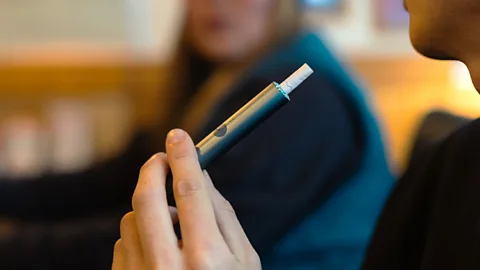Are Heated Tobacco Products a New Health Risk?
As tobacco consumption evolves, a new trend is gaining traction globally: heated tobacco products. While users praise these devices for potentially offering a less harmful alternative to traditional cigarettes, significant health concerns are still at the forefront of discussion.
Ben Taylor, an IT consultant and freelance writer, transitioned from cigarettes to IQOS, a heated tobacco device produced by Philip Morris International (PMI). Having struggled with vaping, Taylor found that IQOS offered a closer experience to smoking with reduced smell and a disappearance of his chronic cough. He is among the many users who report a preference for heated tobacco over vaping, noting, “You can tell you’re consuming real tobacco.”
Global Popularity Surge
Heated tobacco products, such as IQOS, have seen a spike in popularity across over 60 countries, especially in Japan and Italy, where they have been available since 2014. PMI claims that transitioning to these products has helped over 22 million adults quit smoking traditional cigarettes. As they begin to penetrate the U.S. market, crucial questions arise regarding their health implications.
The Industry’s Perspective
Tobacco companies market these products as safer alternatives to smoking, arguing that they heat rather than burn tobacco, thus eliminating most harmful combustion-related toxins. PMI aims for a future with two-thirds of its revenue coming from smoke-free products by 2030.
| Country | Year Introduced | Market Presence |
|---|---|---|
| Japan | 2014 | Growing rapidly |
| Italy | 2014 | Widespread use |
| United States | 2025 | Entry into market |
Health Experts Weigh In
Despite the industry’s claims, public health experts express caution. Some researchers fear that heated tobacco products might not only fail to benefit smokers but could also attract younger, non-smoking users. A study focusing on Italian youths suggested that non-smokers who began using heated tobacco were significantly more likely to start smoking within six months.
Epidemiologist Silvano Gallus argues that existing smokers are not the primary demographic for heated tobacco products, citing trends that show their increasing popularity among adolescents. He warns that such developments could reverse decades of progress in tobacco control.
Controversies and Future Outlook
While the FDA authorizes certain products for marketing, it does not equate to safety. Critics point out that, despite claims of reduced harmful substances, long-term health effects of heated tobacco products remain poorly understood. Evidence suggests that some heated tobacco emissions may contain harmful chemicals similar to those in cigarette smoke.
As heated tobacco products return to the U.S. market, health officials stress the need for research to confirm their impact on public health. The industry can argue for reduced harm, but the reality of their widespread adoption may mask underlying health risks.














